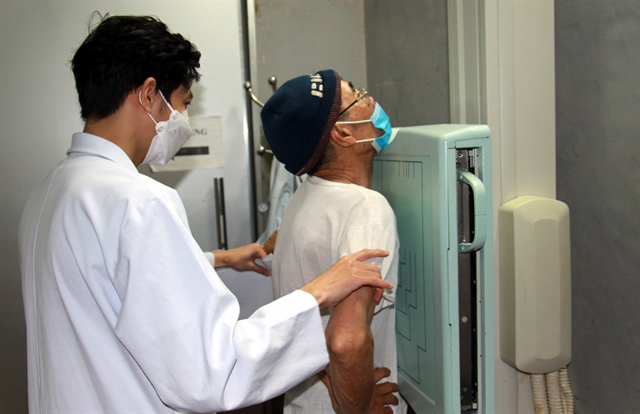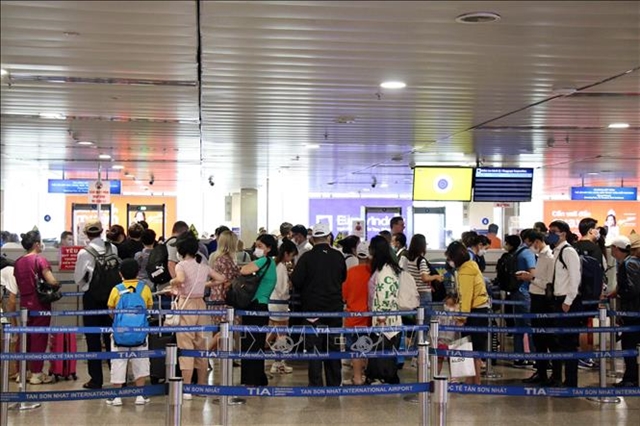 Talk Around Town
Talk Around Town

Some days ago, I met the sister of a friend who returned from the United Kingdom (UK) after completing six years of studies there.
 |
by Hoàng Hoa Sen
Some days ago, I met the sister of a friend who returned from the United Kingdom after completing six years of studies there.
She joined a high school in the UK when she was 16. Now, after completing her studies at the university, she had returned to Việt Nam.
Recalling her six-year stay in the UK, she said they were unforgettable years of her life. She was faced with many difficulties. Many a time she wondered whether she could overcome the challenges. However, thanks to her courage and determination, she finally succeeded in her studies.
“I think it may not be a good idea to go abroad alone and study there at too young an age, like at high school, or as a teenager. When young people have not gained enough maturity and confidence, it may be better for them to stay close to their families,” Lê Kiều Minh, my friend’s sister, said.
“Though those years brought me many benefits such as developing a broader mindset, learning more about different cultures and values and new skills, that period was very challenging. Before leaving, I did not know that it would be so difficult,” she said.
Her stories reminded me of many other stories told by different people about the bad experiences of young people who left their families too early to study abroad.
Some parents regretted having encouraged their children to study abroad at a young age.
“My daughter studied in the United States since she was 18 years old. I hoped that she could gain more interesting knowledge. Moreover, as she was shy, I wanted her to study abroad to become more self-confident and know how to live more independently. But after some years, she became a totally different person, more reserved and quite depressed. She was strongly influenced by American culture, and ignored a lot of Vietnamese traditional culture. I am disappointed. I hope, now that she has already returned to Viet Nam, she will become better,” Nguyễn Thị Liễu, a mother said.
Like many other parents in Việt Nam, Liễu believed that an international education could help their children stand out among their peers in a job market which has become increasingly difficult.
Whether the thought of one day living abroad had ever crossed their mind or not, there is new research to suggest that by encouraging children or teenagers to study and live abroad for at least a semester, young people will be doing so much for their immediate and long-term development.
Statistics from the Ministry of Education and Training shows there are currently 150,000 Vietnamese students studying in 49 countries and territories, 10 times more than 10 years ago. More and more secondary and high-school students are now being sent abroad to study in the US, UK, Japan, and Singapore, apart from Australia and China. Many are aged between between 16 and 18.
However, many teenagers and even some adults, who were not able to adjust to life independently and were not well prepared before leaving home, have suffered from a big culture gap in a multicultural environment, as they were often left isolated, alone and vulnerable.
Life for these children was not a dream as many first thought.
Minh said she found it difficult to integrate into the new world. At home, her mother took care of everything, including her clothes and meals. Living alone in the UK forced her to do everything herself without any guidance. Moreover, lessons at school were very difficult as she neither spoke English well nor understood what she had learnt in school.
According to Nguyễn Văn Toàn, a psychologist from Hà Nội, Vietnamese children become used to total care from their parents when they are very young. Suddenly when they are exposed to an independent life in a completely strange environment, they feel empty and abandoned.
At the age of 16 and 17, their characters are still being formed, so they need the supervision of their parents to adjust and receive guidance.
They may be easily affected by negative impacts of the society. The psychological shocks that teenagers have to suffer at this age may affect their entire future.
Many psychologists in Việt Nam disagree with the trend of sending children to study abroad when they are still very young.
Toàn said, “The future for those teenagers is still so uncertain. They can succeed or fail. They may succeed in life and studies abroad while gaining new useful knowledge and become more independent and mature. However, they can also lose. And once time is lost, it may be difficult to restart their life.”
She herself knows quite a few students who have had bitter experiences abroad due to the lack of life skills and preparations.
By writing this article, I do not wish to imply that parents should not send their children abroad at a young age, but they do need to think over the question: Do their children really have enough abilities and life skills to live a good life, by themselves, in a completely new environment? Not only the children, but the whole family too, should be aware of this issue before young people are sent abroad in haste.
A strong personality is also necessary for young people to survive in a new environment which might be totally different from what they are used to living in. For one thing, he or she needs to have self-control to resist various temptations that may drive them away from studying and even normal living. For another, he or she had better be active enough to integrate into the local community.
I think that once a teenager is determined to study abroad, they should learn in advance about what life in a foreign country will be like, and build a strong mind to face and overcome the culture shock that is awaiting them. Parents should not forget to tell them how to seek help and who they could turn to when they meet difficulties. After all, young as they are, they have to survive on their own from the moment they step on foreign land. VNS








